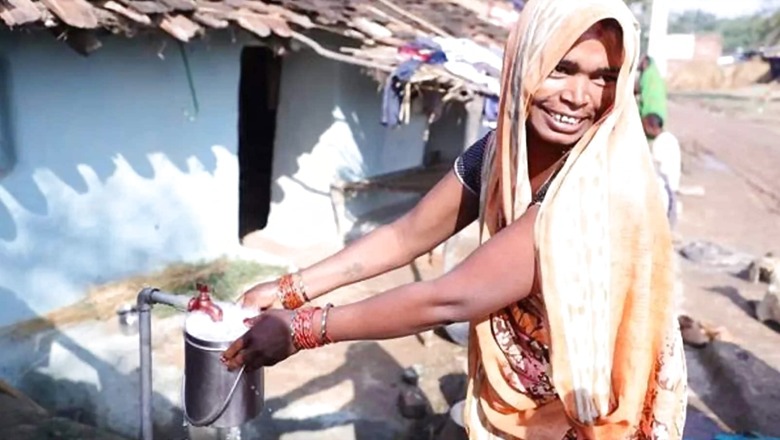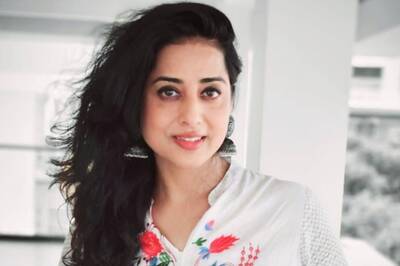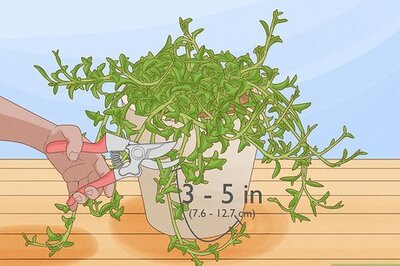
views
Mahatama Gandhi aptly stated that “Woman is the companion of man, gifted with equal mental capacity,” but this fact has been ignored and clouded by gender bias and societal pressures for long.
Taking forward Bapu’s dream of Gramin Vikas and self-reliant villages, it was foreseen long ago that the future of India lies not in its metros but in its villages. The story of Indian villages will not truly change unless gender equality is acknowledged, accepted and followed.
Look at the recent assembly polls in five states. Women voters’ turnout in Uttar Pradesh exceeded that of men. In Gujarat, women are representing more than men in the Panchayati system.
These trends indicate that the representation of women has strengthened in rural India and the social change is driven by the rise in awareness and literacy levels.
The theme for this year’s International women’s day, ‘Gender equality for a sustainable tomorrow’, reiterated the same.
Education, economy and health are all secondary if the basic human need of
Women are given a pivotal role under the ‘Har Ghar Jal’ as they are the primary stakeholders and are involved in the programme from the very beginning. They are part of planning, monitoring and also receive training to undertake water quality testing from time to time. It is a move to empower women and reduce their drudgery.
Also Read: Jal Jeevan Mission Not Just About No. of Tap Water Connections, It’s About Empowering Women
Eighteen-year-old Kalpana, shares that there was a huge water problem in her village Mirtala, Block Kabrai District Mahoba, Uttar Pradesh, India. There were wells on the outskirts of the village from which water had to be fetched. Due to this, all their time was spent arranging water for the family. Moreover, crowding around the public well led to fights and arguments. As water is an essential requirement, she was unable to go to school on time and most of her time was wasted arranging for water. Household tap water connections under Jal Jeevan Mission have made life much easier.
India has over 6 lakh villages. Under Jal Jeevan Mission, every village is to have a 10-15 membered Village Water & Sanitation Committee (VWSC) to shoulder key responsibilities of in-village water supply systems. Every VWSC has a minimum of 50% women’s participation promoting their leadership.
Twenty-eight-year-old Aarti from village Bumer, district Jhansi, Uttar Pradesh shares that when the United Nations Office for Project Services (UNOPS) facilitated a participatory rural assessment with the village community to ensure no one is left behind for mapping of water availability and water logging and sanitation/toilets.
She had only completed her schooling and never got a chance to attend college. The main means of livelihood were agriculture and labour. Due to less agricultural holding, her husband worked multiple jobs to make ends meet. With women not allowed to be seen without a veil, and other existing restrictions to step out of the house, Aarti not only accepted the opportunity given by the Gram Sabha (community meeting) with a sense of pride and devotion, but also supported the work of Jal Jeevan Mission wholeheartedly. Today, Aarti is a well-known face and inspires others to judiciously use water, conserve it and check its quality.
The United Nations Office for Project Services (UNOPS) provides strategic technical support to the Prime Minister’s National flagship Program the Jal Jeevan Mission in the 11 most water-scarce districts of Bundelkhand, Vindhya and Prayagraj regions of Uttar Pradesh, the most populous state of India.
Five women in every village are being trained to lead water quality surveillance in villages, that is, testing water samples using Field Test Kits (FTKs) and uploading data on the portal. Celebrating extraordinary efforts made by lakhs of women across rural India Jal Jeevan Mission encourages women to take up the otherwise male-dominated roles of plumbers, masons, and so on, in villages.
Now, 9.15 Crore (47%) rural households have assured tap water supply in their homes improving ease of living, especially of women and young girls. UNOPS has trained a task force of approximately 700 Women in Water Quality Testing for drinking water sources in their respective villages.
One such story is about Usha Devi, a resident of village Ramgoolam purwa district Banda, Uttar Pradesh, India. Usha shares, “I was always fond of studies but got married at a very young age and could not complete education. Then I had children and was not supported by in-laws to study further. Therefore, I spent my life in household chores. But, I always dreamt of studying further, wanted to do something productive but did not know how?”
“The first time UNOPS came to our village, they discussed clean drinking water, use of toilets and waste management. We were also informed that every house in the village is going to have tap water and these connections will be made under the supervision of the people of the village. Moreover, 5 women were to be selected from the village itself to check the water quality. This was my opportunity, I eagerly volunteered to get my name registered among those 5 women, ” said Usha.
“Today I feel empowered, that despite my limited formal education, I am capable of educating others about water. I have new confidence in me, I take better care of my home, make informed choices, share water conservation techniques, and show how wastewater can be managed efficiently.”
On average, over 500 Litres/Day of water is required in a household consisting of 5 members. As women are mostly responsible for arranging water for the family, the drudgery of the collection also is borne by them.
Savita Kaushik, from Manguwa, district Lalitpur, Uttar Pradesh share her story of how the mapping of ‘Women Time Use Analysis’ facilitated by UNOPS was an eye-opener. The village women were divided into two groups and each group had to prepare a comparative chart of the kind of work done and the time taken from morning to evening.
How much water does the other group spend on what work? Both the groups wrote on the chart paper while discussing in their group. And then both groups gave a presentation. “From this, we realized that it takes more time to fill water. If there is a tap connection in our homes, then we can do other more productive work in that time,” says Savita.
“Similarly, through water use analysis, we realized how much water is wasted by us every day, which could be saved and reused in kitchen gardens. Now we save water and have started using grey water more efficiently,” added Savita. Along with this, she also educates other women from the village to do the same.
Access to safe water gives hope, health and opportunity.
For millions, safe water can turn problems into potential – unlocking education, economic opportunity and improved health. The road to equality is definitely long, but we know we are on the right track.
Madhuri Shukla is a Communication Consultant at the United Nations Office for Project Services. The views expressed in this article are those of the author and do not represent the stand of this publication.
Read all the Latest Opinion News and Breaking News here




















Comments
0 comment